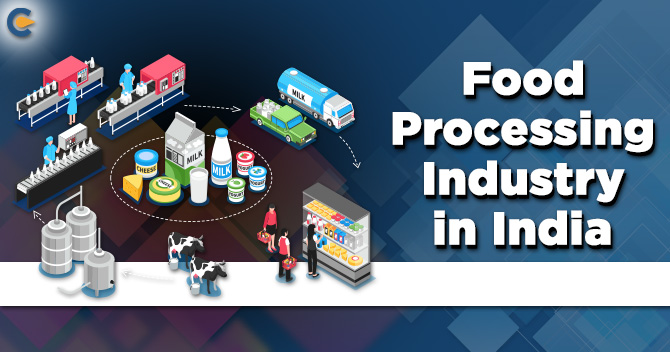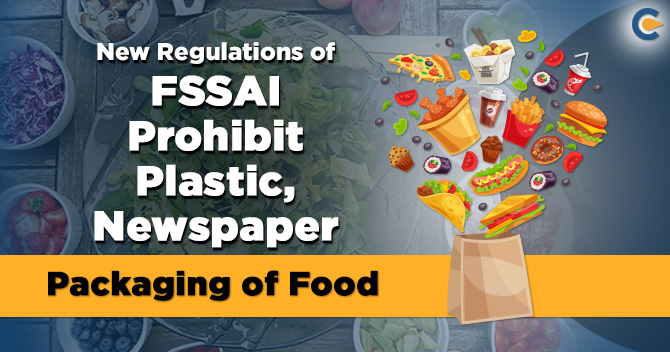In the last decade, the food processing industry in India has beheld a rise of around 11%. The rapid growth of food products processing industry gets ascertained on the basis of its 14% contribution in the manufacturing GDP of the nation along with 6% of exports. India has accomplished second place in the list of largest food producers in the world. There was also speculation that the Indian food industry would reach $480 billion until the end of the year 2020, but due to lockdown, things would not move at the same pace as expected.
The food processing industry in India is emerging as one of the most significant sectors of our Indian economy in terms of employment, GDP, as well as investment. By bridging the gap between manufacturing and agriculture, the food processing industry in India is bestowing people with employment opportunities. With economic policies favoring the food sector coupled with unparalleled financial incentives, loads of investment opportunities are in store.
A recent joint study conducted by ASSOCHAM-Grant Thorton indicates that by the financial year 2024, the food processing sector in India will be generating employment for nine million people. Furthermore, expectations are high that it will create 8,000 direct as along with 80,000 indirect jobs in the regions of the state.
Government Initiatives in Regard to the Food Processing Industry in India
The Government has taken several initiatives to solidify the food processing industry in India. The Government of India is pumping up the promotional activities of mega food parks in order to assist the entrepreneurs so that they can establish their food processing units based on long-term lease method. In the country, the establishment of two mega parks and announcements concerning the functioning of eight new mega food parks by the year-end is bringing the rays of anticipation and hope.
According to our honorable Prime Minister Narendra Modi, in the forthcoming ten years, the five-fold increase will be there in the food processing sector in India. India would get a competitive edge over its competing countries due to India’s evolving technical expertise base and availability of ample natural resources. The government of India has acknowledged the fact that the food processing industry is a high priority industry that deserves better promotion and support. Some reports suggest that the food processing industry in India would reach 50,571 billion Rs. Margin and it will display a CAGR of 12.4% between the financial year 2019 and 2024.
With a corpus of Rs 2000 crore, the Indian government has set up a special fund to empower NABARD so that it will be able to confer entrepreneurs with affordable credit. These entrepreneurs will be utilizing the credit amount in establishing their food processing units or in reviving the already existing food processing units in the sphere of mega food parks.
Government Measures to Upgrade the Food Processing Industry in India
To take advantage of the progression of the food processing industry in India, the government is ushering food processing sectors on the path of prosperity by bringing the following measures into action-
- Make in India Campaign
Since the government has included food processing sector under its make in India campaign, it has allowed 100% FDI through automatic direction into this division for the development of food processing industry in India.
- Mega Food Parks Scheme
Ministry of food processing industries has brought mega food park scheme into the light to provide a significant impetus to the food processing industry in India. This cluster-based scheme offers a mechanism to connect agricultural production to the market by establishing layers of union between farmers, retailers, and processors. This scheme leads to a hike in the income of farmers, maximized value enhancement, creation of employment opportunities, and lessening the wastage up to a great extent in rural areas.
- Food Processing Fund
A food processing fund of Rs 2000 crore, a part of the special fund in the NABARD for providing moderate credit for the establishment of food processing units and Mega Food parks are available in the budget of the financial year 2014-15.
- Pradhan Mantri Kisan Sampada Yojana (PMKSY)
The Cabinet Committee on Economic Affairs gave thumbs up to rechristen the SAMPADA processing scheme as Pradhan Mantri Kisan Sampada Yojana. Fundamental objectives of PM Kisan Sampada Yojana are-
- To decrease the post-harvest wastages
- To supplement agriculture
- To modernize as well as develop existing food processing units
- To modernize processing
- Expansion of preservation capacities
- Few of the element schemes under PMKSY-
- Human Resources as well as Institutions
- Mega Food Parks
- Value Addition Infrastructure
- Food Safety along with Quality Assurance Infrastructure
- Integrated Cold Chains
- Creation of seamless Backward and Forward integration
- Modern Infrastructure Creation for Agro-Processing Clumps
- The Scheme for Integrated Cold Chain, Value Addition Together with Preservation Infrastructure
Launched in the year 2008 with an objective to provide incorporated cold chain, preservation framework facilities in the absence of any break from the fark gate to the customer, this scheme encircles pre-cooling facilities at-
- Mobile cooling Units
- Refrigerated Vans
- Production Sites
- Value Addition Hubs
Read our article:New Regulations of FSSAI Prohibit Plastic, Newspaper Packaging of Food
Categories of Food Processing Activities
The broad classification of food processing activities put these activities into two different categories-
- Commodity Based – This category of food processing activity comprises the elemental processing of commodities like rice, spices, sugar, etc. This form of activity makes up almost 66% of the processed food market.
- Value-Added Processing – This category surrounds secondary along with tertiary processing for milk products, honey, bakery items, fruit juices, organic foods, etc.
In the current scenario, Value-Added Processing is thriving high at a CAGR of 10%.
Challenges ahead for the Food Processing Industry in India
At the inaugural session of World Food India, 2017, Ex-Finance Minister Arun Jaitley told in one of the interviews that the future of India would belong to the most promising food processing sectors in the future course of time. Even though many years have passed, the tremendous expansion of the food processing industry in India has proved the Ex-Finance Minister’s statement right. Government of India is extending full support to this sector due to its immense potential. However, there are some impediments in the food processing sector.
Given below are the challenges that food processing industries have to face-
- Spoilage during Transportation
Before shipping food items that are perishable in nature, it’s mandatory to check the packaging of food items to avoid spoilage and breakage at the time of transportation. Many food items can’t survive for long. Thus, the timely delivery of such food items is essential to avoid food wastage.
- Seasonal Scarcity and the High Price of Raw Materials
- The survival of food processing industries depends upon the consistent production of foodstuffs. Many crops have to face the problem due to seasonal unavailability, and hence, the sector suffers due to delay in production, and eventually, it takes supply to a lower level.
- For instance, Rabi crops like mustard and wheat are dependent on changes in nature, which nobody can even predict. The time to sow these crops is around the month of November, and the harvesting time is in April or May.
- Striking limitations that thwart the growth of food processing units operating on small-scale are increasing the cost of raw materials and seasonal insufficiency.
- Carelessness and Ignorance by Humans
When the process of transporting, shifting and packaging goes on, wastage of food items take place due to the negligence and carelessness of human being. In order to bring a reduction in wastage, formation and implementation of effective measures is the only option.
- Shortage of Food Storage Infrastructure
- Small scale food processing enterprises are undergoing various issues due to lack of storage infrastructure that diminishes the quality as well as brings a reduction in end product availability. Inadequacy in the storage of raw materials would lead to loss and wastage of food. Cold storage and warehousing are the means through which proper storage can take place.
- Problems can occur in warehouses due to lack of space and how in limited space, commodities storage gets managed anyhow. In warehouses, products get damaged very often. Overloading should get stopped as soon as possible to restrict damages.
- Marine food, meat products, beverages, and other products need a special storage place. Due to the unavailability of these facilities, food processing sector suffers.
- A Comprehensive Policy is Missing
The food processing sector is a sector of maximum possibilities due to rapid urbanization and higher food production capabilities. The conducive business environment in the country lures foreign investors. Due to the missing comprehensive policy inscribing the food processing industries requirements, the growth of the food processing sector is at stake.
- Highly Competitive Environment
The involvement of too many players in the organized and unorganized sectors has raised the level of competition. It’s not going to be easy for food processing industries to find out ways for their survival in a highly competitive environment. Therefore, the food processing industry in India must look for improving food quality standards and encourage human resources to cope up with the existing challenges at the global level.
Despite having too many obstacles, food processing sectors are not in the mood to take a nap as they are moving towards evolution and development. The increasing number of food processing units has clarified that the food processing industry in India is here to play long innings.
- Outdated Processes
Customarily, on a manual basis, the foods get inspected. Bring it to a stop for reducing wastage of time and common human mistakes. Technologies should move in a parallel line with highly increasing competition in the global market.
Measures to Surmount these Challenges
- Indian Government has taken several measures in order to prevent food wastage. By adopting measures like India Food Banking Network and National Food Security Act, 2013[1], Government is endeavoring to bring positive changes against food wastage.
- Government is finding out the best possible ways to improve connectivity in rural areas and enhance the condition of poorly-maintained roads.
- Government is laying a robust infrastructure that would further assist in the preservation of perishables.
- Involvement of NGOs as volunteers is aiding in providing linkage between food processing Industry in India, producers, and the market.
- Government has set up the Mini Food Park scheme to upgrade the processing level.
- The government has uplifted the spirits of young entrepreneurs in order to motivate them for entrepreneurship as well as start-ups.
- The increase in skills of the workforce would help the units in fighting against challenges. Taking this point into account, the Government has initiated a 16 certificate course concerning food processing.
- Sales promotion via 100% FDI.
- Introduction of Sampada Scheme has increased the employment opportunities for 5 Lakh people in the period between 2019 and 2020.
National Food Processing Policy
It’s unfortunate that in the agriculture-based countries, farmers are suffering the most. Farmers are committing suicide, and the increase in the cases has shaken the heart of every human being. The Indian Government has analyzed the worsening situation of farmers and came up with a relaxing policy for them. Indian Government has enacted the National Food Processing Policy for boosting the food processing industry in India with the intention of conferring farmers with a moneymaking return. The objective of this policy is to increase productivity, provide benefits to the agriculture, economy, and increasing employment as well as uplifting the standard of people.
Starting a Food Processing Unit in India
The Indian Government has introduced many schemes as well as policies to assist in setting up food processing units in India and to empower them financially for upgrading the industry and making it modernized as well. FSSAI license is a central requirement to commence any food-related business. Several types of FSSAI license are available, and it differs from one business to another.
In Concise
The current trend reflects that the food processing industry in India will continue scaling with time. After the formulation of the National Food Processing Policy, food processing sector would flourish by conquering the challenges. For initiating food processing units, FFSAI license is necessary, and thus, we at Corpbiz would help you in getting the FSSAI License in India.
Read our article:How to Obtain an FSSAI License in India: Full Guide











